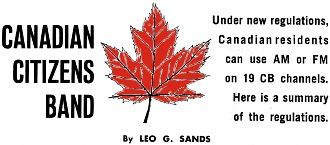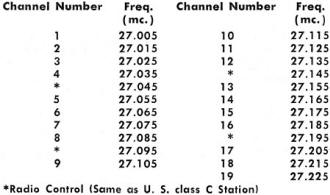Canadian Citizens Band
|
|
Just as in the United States - and most other countries for that matter - Citizens Band radio in Canada has undergone a lot of chances since its inception in the 1960s. This 1962 article in Electronics World magazine reported on the beginnings of Canadian system, known as General Radio Service (GRS). It initially used the same 23 channels (frequencies) as the U.S., although channels 1, 2, and 3 were reserved for Amateur operators and channel 23 was reserved for paging services, leaving only 19 channels for the equivalent of Citizens Band (CB). Both the U.S. and Canada initially charged a nominal fee for an operator license, but neither requires a license today. At the time, some American-made CB radios could not be used in Canada without guaranteeing that the transmit power would not exceed 3 watts (there was no official limit in the U.S., strangely enough). Both AM and FM were permitted. Both countries have since increased the number of available channels to 40. Canadian Citizens Band - Here is a summary of the regulations.
By Leo G. Sands Under new regulations, Canadian residents can use AM or FM on 19 CB channels. The Canadian version of the Citizens Band was opened up on April first. In Canada, Citizens Radio type operations are permitted in what is known as the General Radio Service on 19 radiotelephone channels (similar to U. S. class D) and 4 radio-control channels (similar to U. S. class C). Table 1 - Canadian General Radio Service Citizens Radio frequency allocations. Table 2 - Comparison between the United States and Canadian CB regulations. It is much easier to get a General Radio Service (GRS) license in Canada than a Citizens Radio Station license in the U. S. Instead of mailing an application to the FCC and waiting several weeks to get a license, Canadians may call in person at a regional Radio Regulations Office to file an application. If eligible, the license is issued immediately. A small fee is charged for a license which is good for three years. In the U. S. it is mandatory that the applicant be a citizen, but in Canada, British subjects, Canadian corporations, and landed immigrants are eligible for GRS licenses. As in the U. S., applicants must be at least 18 years of age. Canadian GRS licensees may communicate only with other similarly licensed stations in Canada, utilizing ground-wave propagation exclusively. These requirements specifically prohibit communication with U.S. Citizens Radio stations and "skip" communications. Either FM or AM can be used by Canadian GRS stations, while only AM (A3) can be used by class D Citizens Stations in the U. S. Under Canadian regulations, a GRS station can be patched into a telephone circuit with the approval of the telephone company. But, in the U. S. the use of a phone patch is in violation of CB rules since "third party" communications are prohibited. Only factory-built transmitters or transceivers can be licensed. They must be type-approved by the Department of Transport, and the type-approved number must be permanently attached to the transmitter chassis. In general, the equipment will be similar to Citizens Band sets used in the U. S. Some U. S.-made sets might not qualify for type approval in Canada since Department of Transport technical requirements are stricter than those imposed by the FCC on CB gear. Transmitter power, in terms of watts input to the plate or collector of the final r.f. amplifier, is limited to 5 watts, the same as in the U. S. Power output, which is not specifically restricted in the U. S., is limited to 3 watts in Canada. FCC regulations stipulate that modulation not exceed 100%, but D.O.T. regulations require that AM transmitters be capable of at least 70% modulation with rated audio input. Minimum FM transmitter deviation is ±1 kc. with rated audio input. As in the U. S., transmitters must be crystal-controlled and frequency stabilized to 0.005%. In addition, spurious emissions and harmonics must not exceed 30 microwatts (about 50 db below carrier level) over the frequency range extending from the crystal oscillator frequency to 250 mc. It is expected that U. S. manufacturers will find an eager Canadian market for Citizens Band sets. But, the bulk of the business, it is believed, will go to Canadian manufacturers who have been preparing for the opening of the GRS band. Equipment prices are expected to be slightly higher than in the U. S. Since FM transmission is permitted, some of the new Canadian-built sets now being developed are expected to be FM types. FM sets can be expected to cost more than AM sets. However, the generally superior performance, especially with regard to ignition noise, should create considerable demand for such units. Based on surveys, it is estimated that some 20,000 Canadians will apply for GRS licenses this year. GRS will not take off as slowly as Citizens Band radio did in the U. S. because of the wide publicity given CB radio during the past three years. There are more potential GRS users per capita in Canada than potential CB users in the U. S. because it is not necessary to be a citizen to be eligible for a license. Since licenses are to be issued on the date of application, prospective GRS users can get on the air as soon as the equipment is installed. While Canadian GRS licensees will be operating on the same frequencies as U. S. Citizens Band licensees, they will not be able to communicate with each other lawfully. Canadians cannot legally operate their GRS sets in the U. S. State-side CB licensees cannot operate their sets in Canada without the approval of the Canadian government. Across-the-border communications are prohibited, and the FCC warns that violators will be subject to severe penalties.
Posted June 2, 2021 |
|



